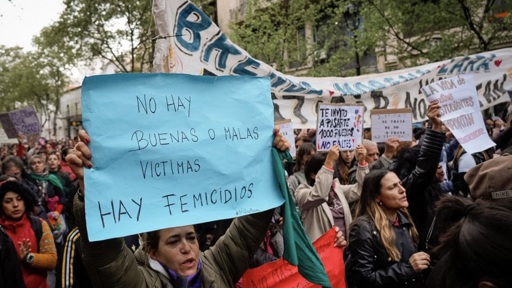“Please country, join us. As mothers, daughters, and sisters,” Carla Saavedra, the aunt of one of the murdered women, told CNN on September 27*,* as thousands took to the streets of Buenos Aires to protest violence against women.
“What happened is terrible. It happened to all of us, not only our family. It happened to all of us as a society.”
Outrage and grief continue to grow in the aftermath of the triple femicide that shocked Argentina last week. The dismemberment of two young women, Morena Verdi and Brenda del Castillo, both 20, and a 15-year-old girl, Lara Gutiérrez, sparked a wave of discourse on social media and spontaneous demonstrations in several cities across Argentina. According to authorities, the crime was an apparent revenge attack by a criminal group.
However, several analysts have pointed out that the crime in question is broader than a specific dispute between criminal gangs. It’s related to the increase in violence and drug trafficking in Argentina, a country where, thanks to the neoliberal policies of Milei’s government, the state is shrinking, eliminating social and gender policies, and losing prominence in poor areas. This aggressive withdrawal of the state, they argue, has a direct impact on crimes against people in general, and in this case, young women in particular.
Considering these and other circumstances, several social movements and feminist groups led a mass march on September 27. “There are no good or bad victims, there are femicides. There are poor young women being murdered. The state is responsible,” said the Ni Una Menos collective.
In response to comments suggesting that the three victims bore some responsibility due to their jobs or the part of the city where they were found, Ni Una Menos stated on social media: “No life is disposable. Not one less. We want to live, be free, and have the right to choose.”
“This triple murder of young women occurs in a context where economic violence causes drug trafficking networks to grow and destroys grassroots organizations,” activists from Ni Una Menos stated on social media.
The march was met with significant police presence, with reports of police attacking protesters with riot shields. The repression of the mobilizations has provoked even more condemnation of Milei’s government.
A decade of Ni Una Menos
The mass demonstration reflects historic mobilizations that the Argentine feminist movement has developed. June 3, 2015, is considered a pivotal day in the history of social movements in Argentina. Thousands and thousands of people filled the streets near the National Congress to demand an end to femicides, after the death of 14-year-old Chiara Páez, who was pregnant, at the hands of her boyfriend. The protest was replicated in more than 100 Argentine cities.
The cry “Ni Una Menos”, originally introduced by poet Susana Chávez in response to crimes against women in Ciudad Juárez, Mexico, was soon echoed in several cities in Latin America and Spain, where feminist collectives quickly formed to protest the alarming rate of deaths of women.
In this way, the Ni Una Menos movement quickly became a very important player in Argentina’s recent history, as it began to highlight certain structural inequalities that contribute to violence against women and are generally portrayed by the mainstream media as “crimes of passion”. As a result, various artists, celebrities, and politicians began to echo the demands.
The claims were soon organically linked to other struggles of feminist groups, such as the right to free and medically assisted abortion, which would finally be legalized in December 2020.
However, the mobilizations and political activity also generated and continue to generate much resistance from various groups close to the Catholic Church, conservatism, and, more recently, the political project led by President Javier Milei himself, who has defunded all public policies with a gender focus, in addition to conducting an active ideological campaign against feminism and LGBTQ+ collectives.
“The ridiculous and unnatural fight between men and women, which only served to hinder progress and create work for bureaucrats,” said the Argentine president in Davos on one occasion, referring to feminism.
In this sense, the majority of popular feminism in Argentina, which tends to be more active on the streets, will insist on its demands not only against murderers and torturers, but also against a state that, embodied in the current government, seeks to undermine the social and political influence it has gained over the last decade, and which today undoubtedly positions itself in the political opposition.
The post Mass protests in Argentina denounce live-streamed triple femicide appeared first on Peoples Dispatch.
From Peoples Dispatch via this RSS feed


